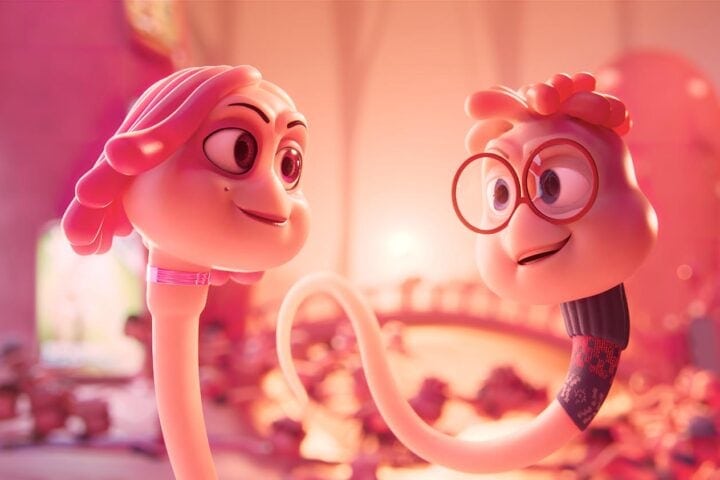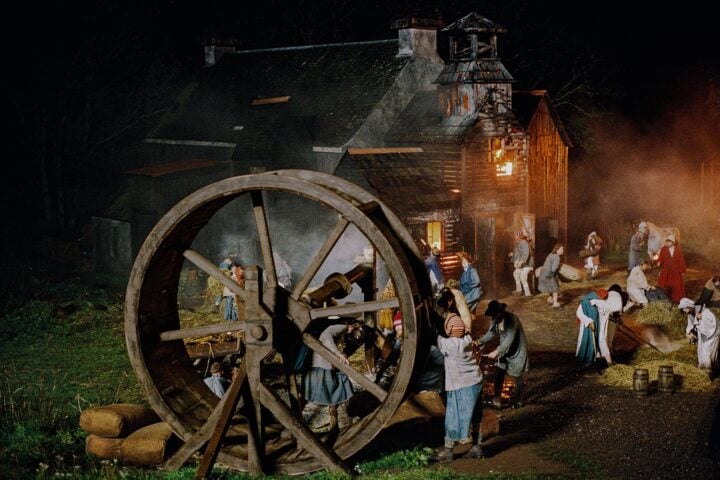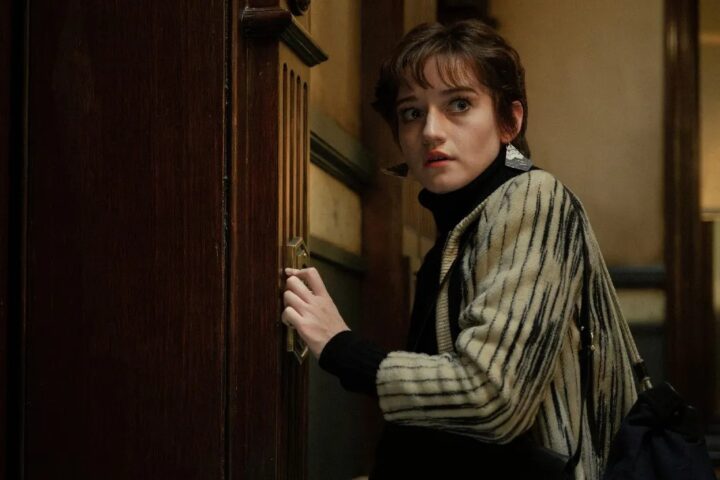One might say the International Film Festival Rotterdam puts the “jaws of life” to the test on cinema during a time when content is valued above all else and the future of movie theaters is uncertain. The festival feels like an inconspicuous balm irrigating cinema’s allegedly moribund machinery. The IFFR consistently serves a non-pretentious combination of Dutch hospitality, efficiency, and casual atmosphere without compromising the largesse and sophistication inherent to iconic festivals. It also helps that Rotterdam is a city dotted by dazzling film venues, boutique and gargantuan alike, all in walking distance from one another.
At this festival, one also senses a sincere commitment to feminist, queer, and experimental works in the selected films themselves, not as glossy public relations fodder. Films like Badrul Hisham Ismail’s Maryam, which tells the story of the eponymous 50-year-old woman (Sofia Jane), an art gallery director in Malaysia, going against a racist, xenophobic, and hetero-patriarchal industrial complex in order to marry a man from Sierra Leone.
Maryam zigzags an urban jungle where she meets Kafkaesque obstacles at every turn, as she tries to obtain the consent of her aristocratic father (Omar Abdullah), the judgmental girlfriends she meets for brunch, and a government official willing to bend his misogyny in exchange for a bribe. Maryam rides her small Mini Cooper from meeting to meeting, which makes for images redolent of some of the sleek compositions from Hamaguchi Ryûsuke’s Drive My Car, which also shrouded its sociopolitical and philosophical subject matter in aesthetic opulence.
While Hamaguchi spins his tale of loneliness and betrayal in a subdued fashion, Ismail’s film, despite also depicting a refined character slithering through a city, is more obvious, and at times melodramatic, about its message. Namely, exposing a woman’s status as a sort of child, or half-citizen, whose comforts depend on her voicelessness. Maryam makes for a more pleasurable cinematic encounter when it isn’t overly concerned with political matters and simply observes Maryam as she wades across a world that will serve her only if she mutes her desires.
This is evident in a few sequences where it’s the mise-en-scène that does the talking, instead of Maryam literally speaking truth to power, and to no avail. These are moments when she bypasses the brandishing of rational speeches in favor of simply embodying the fearlessness of a flâneuse—a flâneuse with an actual target as she braves the oppressiveness of everyday life, moving unflappably from one supposedly impossible situation to the next.
During these scenes, which capture Maryam’s small but fiery existence vis-a-vis the grand hostility of Kuala Lumpur, and the viciousness of its consistently chauvinist citizens, Jane’s presence recalls both Jeanne Moreau’s night-time walk down the Champs-Elysées to the sound of Miles Davis in Louis Malle’s Elevator to the Gallows and Corinne Marchand’s haphazard journeying around Paris in Agnès Varda’s Cléo from 5 to 7. All three are simultaneously indomitable and crumbling—women against a metropolis and its hordes of people.

Georgia Oakley’s Blue Jean is also a film about life made unlivable, only here it’s due to the venomous prudishness of British culture. Set in Newcastle, in the north of England, in the late 1980s, the film follows twentysomething Jean (Rosy McEwen) as she juggles a double life: self-effacing physical education teacher by day and femme club-going lesbian by night. She seems to be doing a good job of keeping these personas separate, even if it means that her silence feeds everyone’s presumptions of her heterosexuality. That is, until one of her students, Lois (Lucy Halliday), also a lesbian, starts showing up at the pub that Jean hangs out with her queer friends and butch, tatted-up punk-rock girlfriend, Viv (Kerrie Hayes), who, unlike Jean, is completely uninterested in passing for straight in order to accommodate homophobes.
As in Maryam, Blue Jean’s protagonist moves through the city with a tiny car. But this moving through is more like a moving against, as homophobia seems to structure, and to invade, every aspect of Jean’s everyday life. Whether the hate speech and the humiliating assumptions come from television, radio shows, co-worker chatter, family get-togethers, or billboards drumming up moral panic, every interaction calls for Jean to take up a position. Either she lies and reproduces the lesbophobic drivel that passes for casual conversation and political discourse, or she tells the truth and risks losing her job and becoming a complete pariah. It isn’t until Jean is forced to make ethical decisions involving Lois and false accusations of sexual harassment involving the girl that the price of self-erasure begins to seem too high to pay.
Oakley’s film, gorgeously shot on 16mm by Victor Seguin (Gagarine, Full Time), can sometimes feel redundant, reminding us too many times that the story takes place in the context of Section 28, which were a series of laws across Great Britain introduced by Margaret Thatcher that banned the so-called promotion of homosexuality. Similar, again, to Maryam, Blue Jean is most remarkable when it simply observes Jean as she exists in her unmanageable world. In this case, when the accusations of sexism and the feminist interventions happen not through the obviousness of words, but through situations that Jean finds herself in.
In one memorable scene, Jean is at her nephew’s birthday party, enduring a compendium of sexist jokes and questions. She’s downed a couple of alcoholic shots by then, and finally musters up the courage to tell her brother-in-law and his colleague that she’s a lesbian, then laughs out loud as she walks out of the house. Hers is a laughter of surprise but also of belated reparation—a feminist laughter that cleverly exposes men as pathetically vulnerable in the face of honesty. In fact, one of the most enjoyable characteristics of Blue Jean is how it exposes sexism and homophobia in British culture, as well as the vulgarity of customs (microwaved canned beans dumped on buttered toast for lunch) and a toxic fabric of social relations evidently built on some primeval phobia of not just lesbians, but sex, pleasure, the body, and the truth writ large.

In Four Little Adults, writer-director Selma Vilhunen imagines a Finland where these social forms of violence (sexism, homophobia, sex negativity) exist but an alternative to them is possible. When Juulia (Alma Pöysti), a progressive congresswoman, discovers that her husband, Matias (Eero Milonoff), with whom she has a son, has been having an affair with the much younger Enni (Oona Airola), she quickly falls into the position of the betrayed woman.
Juulia wants to cry, she wants to shout, and she wants explanations. But once she comes across a polyamory guide, she decides to propose such an arrangement to Matias as a way of not losing him. She proposes to bring Enni into their coupledom instead of breaking up with Matias, or him breaking up with Enni. While Matias and Enni are initially weirded out, everyone realizes that they have something to gain from the proposed situation and decide to give it a try.
The trio eventually becomes a quartet when Juulia meets Miska (Vilhelm Blomgren), a non-binary drag performer, at a local queer club. It’s all fun and games until the partners who aren’t publicly recognized as such, Enni and Miska, begin complaining about their status as secret lovers, as well as demand their rights and recognition as de facto partners.
One of the film’s pleasures is its mix of humor and pathos. It’s as though every absurd situation emerges from or leads to a profound question. In the Finland of Four Little Adults, bearing children’s best interest in mind doesn’t mean “protecting” them from the possibilities of desire, but exposing them to those possibilities. And then finding out that they already know what adults think that they’re teaching. The figure of the child, and of the woman, then, never appears as the fragile being that must be saved from sexuality. In the universe that Juulia concocts, child and woman know better, know more, and before anyone else. And it is, in fact, through the playfulness of childhood that the romantic and sex lives of adults reach a healthier balance.
Arguably the most delightful scene in this clever and disarmingly unpretentious film is when Juulia meets Miska for the first time. As someone flirting with the marvels of non-monogamous hetero-domesticity, Juulia is in complete awe of Miska’s queer exuberance on stage. But it also takes Miska’s own openness for Juulia’s willingness to indulge in previously unfathomable joys for something concrete to emerge. The sequence makes one wonder how many potential relationships (sexual, romantic, or both) are wasted because we aren’t taught to imagine them.
Four Little Adults’s indictment of traditional monogamy is at times wonderfully Bergmanesque. Except here the filmmaker doesn’t stop at the suffering. And despite the freeing queerness of the arrangements, it’s women and the non-binary who end up doing all of the thinking, and most of the suffering. Vilhunen isn’t very interested in the poetics of feminine pain, but in the possibilities that grow from feminine dissatisfaction once a woman dares to end its naturalization by displacing, and multiplying, her sources of enjoyment.
International Film Festival Rotterdam runs from January 25—February 5.
Since 2001, we've brought you uncompromising, candid takes on the world of film, music, television, video games, theater, and more. Independently owned and operated publications like Slant have been hit hard in recent years, but we’re committed to keeping our content free and accessible—meaning no paywalls or fees.
If you like what we do, please consider subscribing to our Patreon or making a donation.




